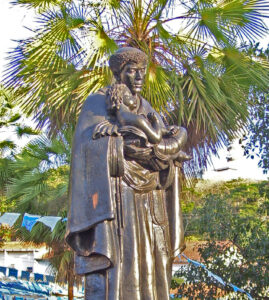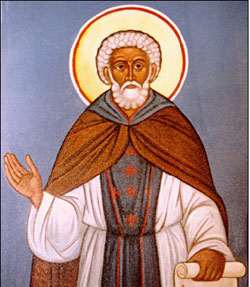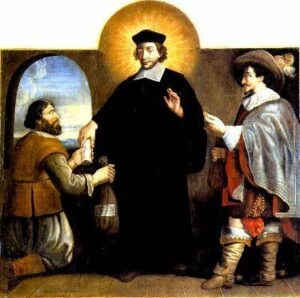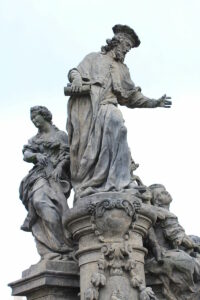Welcome to the Faithful Four! From an initial field of 32 saints, we have sliced the field down to four saints. Only one of whom will be crowned with the 2021 Golden Halo. It's all comes down to Benedict the Moor, who faces Ives of Kermartin today and Catherine of Genoa, who squares off against Absalom Jones tomorrow. Then on Spy Wednesday, the two remaining titans of faith will compete for the ultimate prize, with the winner being announced at 8:00 am Eastern time on Maundy Thursday.
To get to this round, Benedict defeated Nino of Georgia, Euphrosyne, and Camillus de Lellis. While Ives took down Jacapone da Todi, Dunstan, and Arnulf of Metz.
After learning about our saintly heroes via basic bios, quirks and quotes, and even kitsch, in this round, we let our remaining Celebrity Bloggers loose as they answer the question “Why should Saint XX win the Golden Halo?” In other words, they’ve been charged with letting us know why their particular saint is so awesome. We have also invited them to share their two favorite images of their saints.
Let's get this Faithful Four party started!
Benedict the Moor
 When it came time to choose who I would advocate for this year, Benedict of Palermo (Benedict the Moor / African) practically jumped off the page.
When it came time to choose who I would advocate for this year, Benedict of Palermo (Benedict the Moor / African) practically jumped off the page.
Here was a man of African descent, raised in a European community as a racial and ethnic minority. A man who endured hardship, mocking, and discrimination because he did not look like the people around him.
And yet, Benedict found his way.
He found a way to be more than an exception or an outlier. He became a valued member and leader in his community. Benedict was elevated to Superior of his community and served admirably as a leader. In other seasons, he took his place alongside his brothers as equals. He found a way in which he was able to participate in the beloved community – not a token or a curiosity, but valued for the practical talents and spiritual gifts he brought.
Benedict found his way as he turned away from resentment and toward service. Whether cooking for his brothers or healing a traveler or consoling a widow, Benedict’s gifts made every community he participated in better. His life of prayer stirred him to compassion for all who suffered. In our world today, we need more of Benedict’s way of compassion and service.
Benedict found a way to use his heart and his hands – his faith and his action – to give witness to what the life of discipleship looks like. Meditating in the hermitage and cooking for visitors, praying in the room and healing from the bushes. In our world today we need Benedict’s way of active contemplation and contemplative action.
And then, Benedict found a way to remind us of humanity. As the world debated the humanity and belovedness of persons of African descent, Benedict’s legacy shone brightly as a refuation of those who would deny the humanity of enslaved Africans. Here stood Benedict – intelligent and compassionate, capable and insightful – the opposite of every 19th century white/European depiction of Africans. In our world today we need Benedict’s way to remind us of the folly and error of denying the full humanity of our siblings.
Following a pandemic and numerous Civil Rights moments; following generations of quietism and the separation of our  faith from our public lives; following a vile heritage of enslavement, Jim Crow, redlining, and mass incarceration, we need to find our way. Let us look to Benedict and his way of service, humility, prayer, and dignity.
faith from our public lives; following a vile heritage of enslavement, Jim Crow, redlining, and mass incarceration, we need to find our way. Let us look to Benedict and his way of service, humility, prayer, and dignity.
One more legacy of Benedict remains. Jutting out into the Mediterranean, the island of Sicily is a natural landing place for immigrants. There, in the middle of a global crisis of migration, the town of Palermo has become a place of welcome, refuge, and safety for African migrants. Towering over the soccer fields in Palermo where the children of immigrants play, a giant mural of Benedict the African smiles and offers his blessing.
Ives of Kermartin
 Throughout this Lent Madness season, I learned a lot about St. Ives. I had a passing familiarity with him through the St. Ives celebration honoring legal professionals sponsored by the Diocese of New York.
Throughout this Lent Madness season, I learned a lot about St. Ives. I had a passing familiarity with him through the St. Ives celebration honoring legal professionals sponsored by the Diocese of New York.
My research into St. Ives proved the impact of his service to society over the past 700 years. As I delved into his life, ministry and contributions, I was impressed with his quiet leadership, his refusal to give up, his arms ever extended to the poor and downtrodden, his deep devotion to living his faith, his lifelong perseverance and temerity.
He was a priest. He was a lawyer. He was exemplary in both.
He is the patron saint and a guiding star to the legal profession, which honors him worldwide.
I was touched by his dedication to helping the disadvantaged, defending the poor, never turning his back on the needy and destitute, and his commitment to representing the underprivileged, in both civil courts and in church courts.
He braved new frontiers in his legal endeavors. As the “bishop’s judge,” he took this role seriously.
His was not a glossy life. Ives never sought the spotlight. He donated all his earnings to help the poor.
In a time when it was common to take bribes, Ives refused.
In a time when much of the populace was poor and downtrodden, Ives defended them, often pro bono.
I was struck with the words of Pope John Paul II in 2003, calling Ives “a figure who was able to combine a social role  and an ecclesial mission, drawing from his spiritual life the strength for action and for the unification of his being.”
and an ecclesial mission, drawing from his spiritual life the strength for action and for the unification of his being.”
The pope aptly saw Ives as “someone who devoted his whole life to serving Christ in serving the poor, as a magistrate, lawyer, and priest. St. Ivo was involved in defending the principles of justice and equity.”
An image of Ives says it all. He is often depicted with a money bag, representing his donations to the poor, and a scroll, signifying the law.
In this world of so much strife, so much discourse, we can look to St. Ives as a role model for today. Ives is an example of a life well-lived in the spirit of Christ. He is an example of a life that transcends the ages.
I learned a lot about St. Ives during this Lent Madness season. And I am thankful for his enduring example of fairness and faith.
[poll id="329"]
79 comments on “Benedict the Moor vs. Ives of Kermartin”
Benedict The Moor:
Healer, welcomes the stranger
Cooks with the angels.
The recent events in Georgia and in 43 states caused me to vote for Benedict as a much needed saintly figure for this year.
Amen!!
Thank you SO much for all the work everyone puts in creating Lent Madness each year! This is my 3rd or 4th year avidly following and voting and it is a wonderful adjunct to my devotions. It has helped me make Lent a “set aside” time for more meaningful reflection. (On another note, it has convinced me not to take up online betting!) Thank you!
Yes, Susan, very much agree! And very well said. It is an important part of my Lenten reflection. Thank you to the committee for all of your hard work!
Amen, Susan! I'm not sure if it is five or six years for me, but each has been enjoyable and also aided my reflections and enlarged my knowledge.
Here's to you, SEC, I toast you with a mug of St. Arnold's beer!
A difficult one today, both are worthy of acclaim.
With Holy Cross Monastery on my mind - Benedict it is. Blessings through this Holy Week All.
I'm certain that Benedict will win this round, and that's well and good. I voted for Ives because he was a member of the majority population in his location who did not take advantage of his privilege but devoted himself to those who had none. For those of us who are not BIPOC, Ives stands as an example of how to do the same. I feel that he deserves a good showing, even if he doesn't win this one.
Seems to me that all of the Final Four are worthy of the Golden Halo, so we're in the "honored just to have made it this far" arena.
Note to David Hansen: with respect, this: "As the world debated the humanity and belovedness of persons of African descent..." is a concerning passage. How do you define "the world"? Because, if you're referring to the 19th century, you're only addressing people in European and European-descended communities. There were a lot of people in the world who would never have questioned the humanity and belovedness of any person, inside or outside of the Christian sphere of influence -- including many people of European ancestry. If you're referring to governments and those in power -- again, this was largely a question for parts of Europe and the Americas. BTW it's worth noting that Canada began passing anti-slavery and anti-trafficking laws in the 1790s, even before the 19th century began (full abolition came to the British Empire in 1833). So, only "the world" if the world just includes certain European powers that were still involved in the African slave trade, and those strongly influenced by them.
Side note: there are over 40 million enslaved people in the world today, according to the Walk Free Global Slavery Index. An estimated 71 percent of them are women. See https://www.globalslaveryindex.org/ (I'm unaffiliated)
Thanks, Belle, for the information and your insights. We white folks continually make the mistake of thinking only of ourselves when we refer to "the world" and other generalizations. We need to step back and widen our frames of reference.
What is BIPOC?
Black/Indigenous/People of Color?
Black, Indigenous, People Of Color.
Black, Indigenous, People of Color
BIPOC is the acronym for Black, indigenous, people of color.
Belle, you put the things I was feeling in to such much more elegant words than my mind was yelling. St. Ives, to me, embodies more of what we need in these times - compassion and fairness from our judiciary branch and an understanding that the image of God is in all humans and they should all be treated with love and compassion without resorting to bribes or rhetoric.
I also often remind people that the world still condones in one way or another the continued enslavement of people and especially women. Thank you for pointing that out.
Well stated, Belle.
Thank you. This is mainly why I voted for him too — notwithstanding that I am also a lawyer and Vice Chancellor!
Thanks, Belle, for your response. I agree with you. I must point out, though, that while the Abolition Bill was indeed signed in England in 1833, Emancipation was not declared until 1834 and was not a reality in the British West Indies until some time later. A four year "apprenticeship scheme" left the former slaves no better off. In fact, it served to disadvanatge many of them even more as they became responsible for feeding and clothing themselves while often working without pay as they supposedly learned a trade. And then the former slave owners received reparations for their loss of property, with the final payments being made only recently, while the former slaves continued to eke out a living on the plantations .
(This Sandra is not the Vice Chancellor.)
Agonising choice today. I would like to vote for both, but opted for St Ives. In part my decision was based on an expectation that Ives, whilst a hugely signifiacnt figure resonates less with the times we live in and I wouldn't like him to be too far behind, and in part because when the systems of governement are corrupt, we have no option but to turn to an idenpedent judiciary. When law firms in the UK are crowdfunding to hold the government to account, we are in trouble. We need Ives' integrity and compassion in public life.
"We want Moor! We want Moor!"#gobenedictgo
“We want Moor! We want Moor”. Very much agreed.
Hear, hear, we have four wonderful semifinalists to choose between. I will be selfish, and pick Benedict to help my bracket and also to thank him for lending me his angels to help out in my kitchen. My wife is appreciating the newly heavenly fare I'm putting out.
Honestly wanted Ives. @thechalicebearer what’s up dood. How you doing today man?
Thank you, David! You ‘found a way’ to garner my vote for Benedict who always ‘found a way.’ ‘There is always a way’ has, of late, become a mantra for me. Your championing of Benedict ha s sealed the deal in so many facets of daily life and interactions.
Thank you!
Benedict's appeal was ineluctable,
His saintliness indestructible.
A servant of the poor,
The body of the Moor
Remains forever incorruptible.
Oh, good one!
Particularly difficult choice today. I was struck by the challenge of choosing between a man of minority status in his community who “ found his way as he turned away from resentment towards service” and a man of privilege who “was a member of the majority population who did not take advantage of his privilege but dedicated himself to those who had none”. We need more Benedicts and Ives in our community today.
You are so right. Ives reached down to lift up the poor and marginalized - using his privilege, learning and status. Benedict, holy, humble and multi- talented in the most basic of domestic arts - reached out to everyone - even to those who might have mistrusted him because of his race. We need more of these persons in the world today. Can I split my vote? Guess not, so I'm voting for Benedict.
The integrity of the powers that be is vital.
So is the steady perseverance in the face of repression.
Good lawyers can help but, in the end, the repressed must persevere.
So, Benedict get my vote today.
As the co-founder of a retreat house, Benedict the Moor, that soul of hospitality and service, has my vote today and my prayers to help as we strive to match his generosity to pilgrims and those seeking a haven.
Although it would seem that this year's Golden Halo will go to either Benedict the Moor or Absalom Jones, I cast my vote today for Ives of Kermartin, a priest and a lawyer who used his privilege to raise up others. A fitting saint for our times. On the other hand, I'm pulling for Absalom for the coveted Halo because in 2021 because, judging by recent events in Georgia, his fight is nowhere near won. Quite frankly, when it gets down to the final four choices, there's really not a pin to choose between them. They are all faithful servants of God and great exemplars for the rest of us.
Benedict helped the poor and was good in the kitchen, he gets my vote.
Easiest choice all season, let’s get shed of the lawyer and embrace the Moor,
An active contemplative and a contemplative in action who was a Franciscan and also a cook. Benedict appeals to me on so many different levels, even as I have great respect for Ives and his example of what good lawyering looks like.
Sticking with my lawyer Dad today for Ives.
They were both caring for those who were deemed less than and gave more of themselves to their communities with no thought of reward for themselves. Plus my Dad was a cradle Episcopalian snd he snoozed through many of a sermon, he put the well being of people before the purse.
It's interesting (to me, at least) how different days and rounds are difficult for varying reasons. I'm guessing (and kinda hoping, it appears) that Benedict will take this round. Incorruptible remains (which I find creepy) aside, he's had my vote the whole way as has Yves. Admirable and endearing (and those two words fall so very short, but for the brain fog no better ones are coming to mind at the moment).
Yet in my present circumstances of feeling like I need an advocate (more medically than legally) in systems that are set up to run roughshod over me (and too many others), I thought I'd cast one more vote for St. Yves this year...
Really hard choice today! I confess I just closed my eyes and tapped till a button lit up. Ives.
I’m such a coward.
You may have solved my problem, Vicar Mollie. I thought going in I would vote for Ives, since I'm a huge fan of the rule of law (and honorable lawyers.) But then again, Benedict speaks to me and our times and David Hansen's write-up was exceptionally good. I prepare my (possibly cowardly) fickle finger of fate.
I was all for St. Ives to take the win but such great writing and perspective on Benedict. I'm changing my vote to Benedict, he is def the saint we need this year!
I knew that Benedict would win and in so many ways he deserved it but Belle expressed my feelings exactly. We need people like St. Ives who was unafraid to do justice where it was due.
Thank you David Hansen for that moving tribute to Benedict of Palermo. You have eloquently expressed all that I've been thinking about as I have further researched Benedict every time he's come up in a bracket this year, including the crossroads we are at as a nation and the work we each need to do as individuals to end systemic racism and the ways I know I need to better orient my life (I am needing this reminder) towards compassion and service, contemplation and action. There's so much depth in your short description, I know I'll be re-reading it as I move through my week. Thank you for laying out such a dense spiritual feast.
Thank you for your kind words.
Well written, both bloggers. It's holy week, and we can now see the spires of Canterbury. I will be sorry to see LM end for another year, but I'm sure the SEC and bloggers will now turn their attention to Easter and the demands of its liturgies. Thank you so much for all you have done to aid this little company of pilgrims through another COVID Lent. I am aware of the temptation to be part of voting two black men into the final round for the Golden Halo; it's a "good look" for the community. But what moves me in this round is the dual global need for action on behalf of migrants and good public policy girded by a sound legal system. Justice. May honest lawyers and journalists thrive. The image of Palermo as a city welcoming desperate migrants, and the phrasing of John Paul II, "unification of being," both resonate with me. May contemporary democracies actually become so, and unify equity and justice in their political structures and social commitments. I voted for Ives, for laws that meet people where they are and enhance fellow feeling and a vibrant public life.
You've convinced me. I'm choosing Ives for the reasons you said.
Wow! I knew it would get harder, but not this hard. What swung it for Ives is that people need an advocate often times merely to be seen. Just to be seen. That he represented those who needed help whether or not they mattered to anyone else is incredibly important then, and now. Both are good people, but I also don't know if Benedict felt resentment to overcome, I just know that I wou feel all kinds things I'd have to overcome.
2021 is my first year of Lent Madness and thanks to everyone for making it a great experience! The SEC and the Celebrity Bloggers were great--and the comments were spot on. Thanks for bringing some lesser-known saints into the bracket--I learned about many for the first time, not bad for an eighty-something year old female. I'm already thinking of saints for 2022. Again, thanks and whoever wins the Golden Halo deserves it!
Ives for me. I'm thinking of the real-life circumstances of those in "Just Mercy" and also of the fictional Jean Valjean stealing a loaf of bread. The poor and those viewed as inherently suspicious or guilty need a good lawyer to advocate for them. "Will you strive for justice and peace among all people, and respect the dignity of every human being?" St. Ives lived out this baptismal covenant.
As a Franciscan tertiary, I'm excited to see two Franciscan tertiaries in the final four along with a first order brother. So you could say the real winner is Saint Francis of Assisi. Between Brother Benedict and Brother Ives, I'm sticking with my order and going with St. Ives.
Another Lenten Madness ending too soon.
Happy days everyone until we meet again!!!!